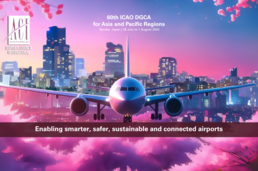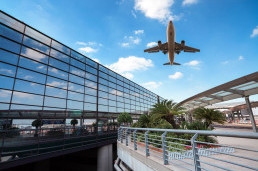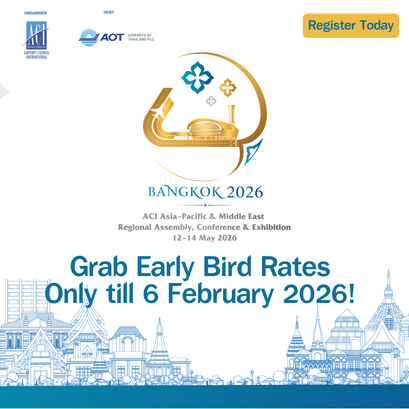
Security tech adoption accelerates across Asia-Pacific and Middle East; Slot policy must catch up
- 2025-11-26
- Deployment of advanced CT scanners and body scanners at airport security checkpoints is rising sharply across the Region, and is expected to double by 2028
- ACI Asia-Pacific & Middle East warns that outdated slot allocation system requires to be modernised in the long term to tackle airport traffic congestion.
As Airports Innovate commenced in Busan today, Mr. Stefano Baronci, Director General of ACI Asia-Pacific & Middle East, the association representing over 600 airports, delivered a strong State of the Industry address, calling for industry-wide innovation and policy reforms to future-proof airport operations.
.jpg)
Mr. Baronci stressed that staying aligned with technological advancement is essential to remain competitive, but resolving airport capacity challenges will require a policy dialogue between the industry and States to reform the outdated global slot allocation framework.
Upswing in adoption of security screening technologies
Releasing the key findings of the ACI Asia-Pacific & Middle East security technology survey, Mr. Baronci highlighted the push for modernisation at security checkpoints, often cited as the most stressful point in the passenger journey at airports.
The survey, which gathered data from 48 airports from Asia-Pacific and Middle East regions, revealed a strong commitment to adopting next-generation screening tools across the regions.
Key findings
- Deployment of CT scanners and body scanners for cabin baggage and passenger screening is rising sharply and is expected to double by 2028.
- Small and medium-sized airports are adopting new screening technology at a pace comparable to larger hubs.
- Cost and space remain the top barriers for smaller airports, with CT machines costing up to 10 times more than conventional X-ray units.
- AI-enabled screening support, including Automated Prohibited Items Detection Systems (APIDS), is gaining traction and potentially pointing towards a more efficient detection in the future.
“As passenger expectations are rising, security must evolve with them. Our latest survey shows that airports across Asia-Pacific and the Middle East are ready to embrace advanced screening technologies despite cost and space constraints,” Mr. Baronci said.
“Today’s Passengers expect not only a safe service but also an increasingly sophisticated customer experience. We are proud to report that both the Asia-Pacific and Middle East regions continue to outperform the global average in terms of satisfaction and overall experience, according to the latest ACI World data in Q3 2025.” he added.
Call for Slot Reforms
Innovative changes are also equally essential to enable the industry to meet its economic and social objectives. In line with the conclusion of the 42nd ICAO Assembly, the Director General urged institutional and industry stakeholders to work collectively to modernise the outdated Worldwide Airport Slot Guidelines (WASG), the framework that governs how capacity is allocated at congested airports, while taking into consideration local infrastructure realities.
The WASG has remained largely unchanged since 1974, despite profound changes in aircraft technology, airline business models, and market dynamics.
Current pressures:
- 215 airports globally now require full slot coordination. The number of congested airports has increased from 170 in 2015.
- Asia-Pacific is the second most congested region after Europe.
- The legacy 80/20 rule of slot allocation, giving incumbents near-automatic retention of slots, reflects an era before liberalisation and limits airline competition, impacting affordability for passengers.
“Since the current slot system has barely changed in 50 years, it no longer fits an industry that is rapidly innovating. Updating this system is essential to ensure aviation continues to create long-term economic and social benefits. At ACI, we believe that while established carriers should continue to benefit, there must also be equal opportunities to review access in line with changing demand patterns, connectivity priorities and policy objectives based on local considerations,” Mr. Baronci highlighted.
ACI APAC & MID recommendations to modernise slot policy
- Treatment of historic precedence should also reflect alignment with local access priorities, measured in terms of economics and social benefits that air services bring to communities
- Slot retention linked to indicators for efficient and responsible use, not merely minimum operation thresholds
- Genuine opportunities for new airline and market contestability
- CATEGORY
- COUNTRY / AREA
- Hong Kong SAR
- AUTHOR
- ACI Asia-Pacific & Middle East







